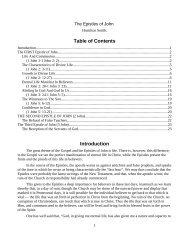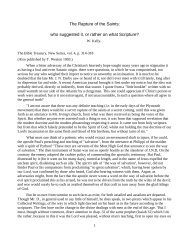An Exposition of Revelation .pdf
An Exposition of Revelation .pdf
An Exposition of Revelation .pdf
Create successful ePaper yourself
Turn your PDF publications into a flip-book with our unique Google optimized e-Paper software.
the same evils exist, and that which would keep the church as a chaste virgin espoused to Christ is<br />
gone, no wonder that these warnings are misunderstood. Worldliness had got in, as it still remains,<br />
and, alas! is palliated most by those who owe their pr<strong>of</strong>essional status to its corrupt and corrupting<br />
influence. The unbelief which let in the mischief keeps it in, decrying the true application <strong>of</strong> the two<br />
edged sword now as then. Christians were dazzled by the world's power and glory, which was put<br />
forth doubtless in protecting, not themselves only, but the public faith <strong>of</strong> Christendom in that day. But<br />
none the less did they fatally compromise Christ by alliance with the world, followed by practical<br />
return to the circle, out <strong>of</strong> which grace had taken the saints in order to union with Christ in glory.<br />
"So hast thou also [men] holding the doctrine <strong>of</strong> Nicolaitans in like manner." To the angel <strong>of</strong> the<br />
church in Ephesus the Lord had denounced "the deeds <strong>of</strong> the Nicolaitans"; but now the iniquity in<br />
question (antinomianism, we conceive) had become a. doctrine; so that it seems compared with the<br />
iniquitous doctrine <strong>of</strong> the Balaamites. "Repent therefore; or else I am coming to thee quickly, and will<br />
war against them with the sword <strong>of</strong> my mouth." Thus the Lord was no longer fighting in defence <strong>of</strong><br />
His own people, nor was He employing the enemy's hatred and persecution to nip in the bud or<br />
prune evil excrescences. We have seen this just before: a greater trial now appears. Alas! the state <strong>of</strong><br />
those that bore His own name was such that He was obliged to deal thus sternly with them. Enemies<br />
were within. But His coming here as to the Ephesian angel does not mean His personal presence, but<br />
His judicial visitation while unseen.<br />
"He that hath an ear, let him hear what the Spirit saith to the churches: to him that overcometh,<br />
to him will I give to eat <strong>of</strong> the hidden manna." When the church was snared by the bait <strong>of</strong> public glory,<br />
the encouragement to faith was the hidden manna. Let there be at least individual, even if here<br />
unvalued, faithfulness to the Lord Jesus. Some saints might be true to His name, though it was not the<br />
time when they were led or forced into the position <strong>of</strong> a remnant. There was not yet the fidelity that<br />
came out from the public body, corrupt as it was. Energy <strong>of</strong> faith failed for, this; but individual fidelity<br />
to Christ was not lacking; where this was, "to him," says the Lord, "will I give to eat <strong>of</strong> the hidden<br />
manna, and I will give him a white stone, and upon the stone a new name written, which none<br />
knoweth save the receiver." To the true heart His approval is enough, nearer and dearer than any<br />
triumph before the universe.<br />
Then follows the last <strong>of</strong> these four churches, but the first where the call to hear is changed. "<strong>An</strong>d<br />
to the angel <strong>of</strong> the church in Thyatira write." One cannot doubt that this letter contains an apt<br />
adumbration, as far as could be there in present facts, <strong>of</strong> what was found in mediaeval times. "These<br />
things saith the Son <strong>of</strong> God, he that hath his eyes as a flame <strong>of</strong> fire, and his feet [are] like fine brass."<br />
Christ is revealed now, not only in the all-discerning power <strong>of</strong> moral judgment, but also judicially<br />
prepared to act against evil: "His feet are like fine brass." "I know thy works, and the love, and the<br />
faith, and the service, and thy patience, and thy last works [to be] more than the first." There was here<br />
and there devotedness in the middle ages, spite <strong>of</strong> the darkness and ignorance that prevailed in point <strong>of</strong><br />
doctrine. But those who loved the Lord showed their love then, not so much by intelligence in His<br />
ways as by unsparing and habitual self-denial. One does not surely speak <strong>of</strong> superstition, either as to<br />
Mary or the church when each was made a sort <strong>of</strong> bona Dea, but <strong>of</strong> the fruit <strong>of</strong> looking to Christ<br />
however simply.<br />
"But I have against thee, that thou sufferest the woman (perhaps 'thy wife') Jezebel." This was a<br />
new kind <strong>of</strong> evil altogether. It is not clericalism now, nor persons holding the doctrine <strong>of</strong> Nicolaitans<br />
or that <strong>of</strong> Balaam, but a formed state as the symbol <strong>of</strong> a woman regularly represents. Examine the use<br />
<strong>of</strong> woman symbolically, and this will be found true. The man is the agent who goes forward; the<br />
18






